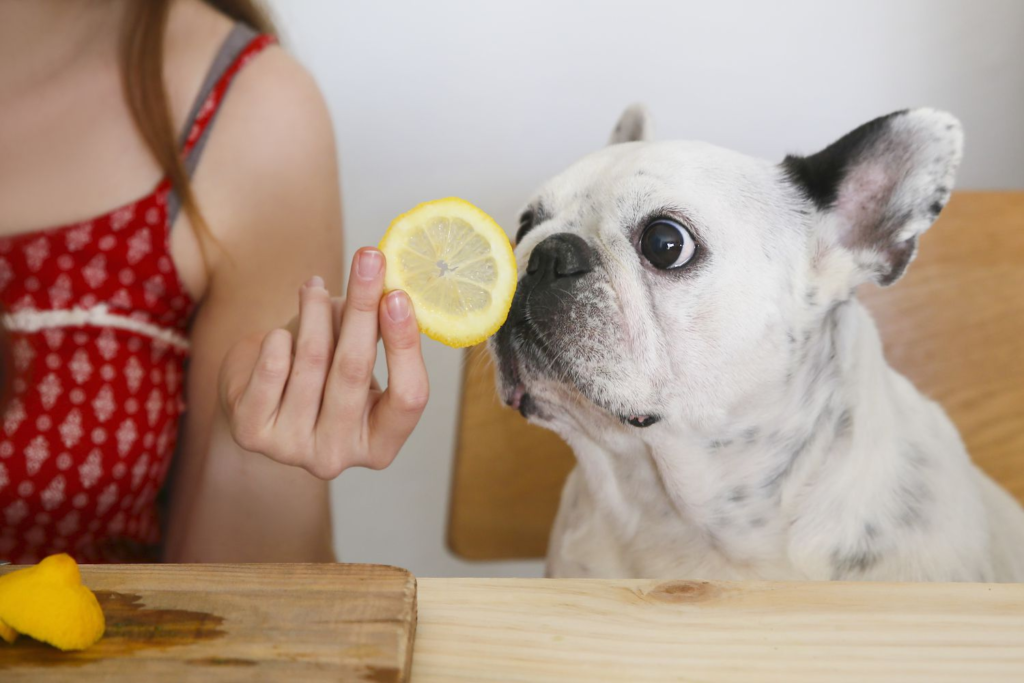Can Dogs Have Lemon Water?

Can Dogs Have Lemon Water?:- When it comes to sharing human food with dogs, many pet owners are cautious, and rightfully so. One common question that arises is whether lemons are safe for dogs. While the flesh of lemons is not outright toxic to dogs, feeding them this fruit is still discouraged. If consumed, lemons can cause digestive issues in dogs, and most of them naturally dislike the sour taste.
Dr. Jerry Klein, the Chief Veterinary Officer for the American Kennel Club (AKC), advises that although dogs technically can eat lemons, they rarely do so voluntarily. He states, “Dogs can eat lemons, though they do not eat them voluntarily, as they do not like the pungent citrus smell.” This aversion to the sharp scent and sourness of lemons serves as a natural deterrent for most dogs.

The Potential Dangers of Lemons
Can Dogs Have Lemon Water?:- The fact that dogs are generally repelled by the smell of lemons is a positive thing because lemon juice contains high levels of citric acid, which can be harmful to dogs. Citric acid, especially in concentrated forms like lemon juice, can upset a dog’s digestive system and may even cause more severe reactions. Beyond just the juice, the lemon rinds and skins pose additional risks. Lemon peels contain psoralen, a chemical compound that is toxic to dogs. Ingesting the rind can cause gastrointestinal blockage, which is a medical emergency.
If your dog happens to eat a whole lemon or just the rind, it’s crucial to contact a veterinarian as soon as possible. The veterinarian may advise you to monitor your dog for symptoms such as vomiting, diarrhea, or signs of discomfort. Even though small amounts of lemon may not cause severe harm to all dogs, ingestion of larger portions can lead to significant health problems.
Why Do Dogs React Strongly to Lemons?
Dogs have a natural aversion to bitter tastes, which may explain their strong reactions to lemons. As Karina Carbo-Johnson, MS, a nutritionist with Purina, explains, “Dogs do not like bitter taste and will generally have a negative reaction. A sour taste can also be detected, but it’s not always negative. Dogs have learned to avoid bitter tastes due to the association of poisonous foods, leading to better survival rates.”

This evolutionary trait helps dogs avoid consuming harmful substances. Lemon, being a citrus fruit, contains essential oils and other compounds that are toxic to dogs. These are found in various parts of the lemon, including the plant, tree, skin, and even the pith, which is the white part just beneath the peel. As a result, dogs instinctively avoid lemons, which works in their favor since consuming too much of the fruit can be harmful.
My Dog Ate Lemon. What Should I Do?
Can Dogs Have Lemon Water?:- If you suspect your dog has eaten a lemon, the best approach is to monitor them closely for signs of illness. Common symptoms of digestive distress include vomiting, diarrhea, and a lack of appetite. While not every dog will show immediate symptoms, it’s essential to keep an eye on your pet for any unusual behavior. If your dog shows signs of severe discomfort or illness, contact your veterinarian immediately.
Dogs that are smaller in size, elderly, or have underlying health conditions are generally at higher risk of adverse effects from eating lemons. In extreme cases, dogs may experience tremors, difficulty breathing, or weakness after ingesting lemon. If your dog exhibits any of these severe symptoms, seek veterinary attention immediately.
Can Dogs Die from Eating Lemon?
While it is highly unlikely that a healthy adult dog would die from eating a small amount of lemon, certain dogs may be more vulnerable. Puppies, small dog breeds, and dogs with pre-existing health conditions may face more significant risks. Even though a single lick or taste of lemon is unlikely to cause serious harm, larger quantities of concentrated lemon juice can lead to more severe health issues.
If you’re unsure how much lemon your dog has consumed or whether they are at risk, it’s always best to consult your veterinarian. The vet will be able to assess your dog’s weight, age, and overall health to provide tailored advice.
Lemon Toxicity in Dogs
One reason to be cautious about feeding dogs lemons is the presence of toxic compounds like psoralens. Psoralens, which are found in the peel and seeds of lemons, can cause significant health issues in dogs, including gastrointestinal distress. While these compounds are sometimes used in humans to treat conditions like psoriasis, they have no therapeutic value for dogs and can, in fact, be harmful.
Lemon’s acidity can also contribute to stomach upset in dogs, similar to how acidic foods might cause acid reflux in humans. This acidity can irritate a dog’s digestive system, leading to discomfort and possible health complications. It’s also important to avoid giving dogs lemon-flavored products like lemonade or lemon tarts, as these often contain sugar or artificial sweeteners, such as xylitol, which are harmful to dogs.

How to Safely Introduce Lemons to a Dog’s Diet?
Can Dogs Have Lemon Water?:- If you’re considering introducing a small amount of lemon into your dog’s diet for any reason, it’s essential to do so with caution. A tiny amount, such as ¼ teaspoon of lemon juice per 20 pounds of body weight, maybe safe if mixed into food. However, you should always test whether your dog even enjoys the flavor. If your dog tries to avoid the portion of food with lemon juice, it’s best not to force it.
It’s also critical not to add lemon juice to your dog’s water, as this could lead to them avoiding drinking altogether, which can result in dehydration—a serious health concern.
Why Are Lemons Bad for Dogs?
From a health perspective, lemons offer no nutritional benefit to dogs. The citric acid found in lemons makes them toxic, especially in large amounts. Additionally, frequent consumption of acidic fruits like lemons can erode the enamel on a dog’s teeth, leading to dental issues over time. The psoralen compounds present in lemon trees and fruits can also cause adverse gastrointestinal reactions, such as vomiting and diarrhea.
Fortunately, most dogs find lemons unappealing due to their strong smell and bitter taste, reducing the risk of accidental ingestion. However, it’s still important for dog owners to ensure their pets don’t come into contact with lemons or lemon-flavored products.
Safer Alternatives to Lemon Water
If you’re looking for ways to provide your dog with a refreshing treat or encourage hydration, there are plenty of safer alternatives to lemon water:
1. Plain Water: The best and safest option for keeping your dog hydrated is plain, fresh water.
2. Flavored Water: Adding a small amount of unsalted chicken or beef broth to your dog’s water can provide flavor without harmful ingredients.
3. Cucumber Water: Adding cucumber slices to water is another safe and hydrating option for dogs.
In conclusion, while lemons may not be outright deadly for dogs, they offer no health benefits and come with several risks. It’s best to keep lemons and lemon-flavored products away from your furry friend to avoid potential health issues. Always consult with your veterinarian if you’re unsure about the safety of certain foods for your dog.
Also Read:-




